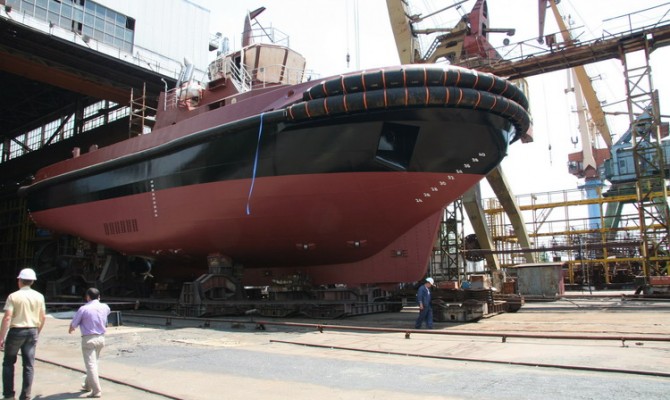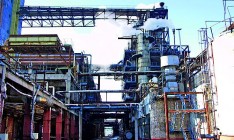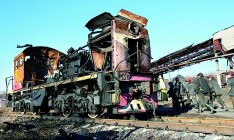Business
ShipbuildingCrimea takes its toll and Ukraine is losing its leading shipbuilding companies

Yesterday, the Council of Ministers of Crimea announced creation of the new Russian state enterprise More and conveyed to it all the property of the former namesake shipbuilding company owned by the state of Ukraine, located in Feodosiya. The factory was nationalized at the end of June in order to build “new types of maritime passenger vessels, provide new jobs and increase tax returns to the budget”. Now, the new company owns the plant’s administrative buildings, process communications, industrial sites, equipment and means of transportation.
Minister of Industrial Policy of Crimea Andrei Skrynnik says now officials are doing everything to get the company government contracts. In addition, he noted that More will work in cooperation with another Crimean shipyard – Zaliv. As a reminder, until recently this plant belonged to Ukrainian businessman Kostyantyn Zhevago, but in late August Crimean security forces conducted an illegal takeover of the enterprise. At the same time, Andrei Zherdev, a representative of the Gorky Zelenodolsk Plant (located in the Republic of Tatarstan, Russia), came forward as the director of Zaliv, saying that the Tatarstan corporation took production capacities of the Crimean shipyard on a long-term lease.
Importance for the industry
Experts say the loss of shipyards in Crimea is very noticeable for Ukraine’s shipbuilding industry. Former director of the Sevastopol Maritime Plant (currently director of Zorya – Mashproekt) Kostyantyn Kartoshkin said that Zaliv was the most modernized and up-to-date enterprise, as well as the most prepared for construction of heavy-tonnage vessels. He said for many years the company has worked with Norwegian ship owners, for which it constructed supply vessels and was ready to build complete ships, whereas other Ukrainian plants require significant preparatory works and considerable funding to enable them to produce complete vessels and not be limited to ship repair works, as is the current situation.
Based on estimates of Senior Analyst at the Art Capital Investment Group Oleksiy Andriychenko the total revenues of major domestic shipbuilders in 2013 were approximately UAH 1 bn, which 40% of Crimean enterprises accounted for.
What happens to the other shippers?
At other industry enterprises located on the mainland things are not too bright. Based on the data provided to Capital by the Public Relations Department at Smart Holding (which owns the Kherson and Chornomorske shipyards (CSY), the current load at Ukrainian shipyards does not exceed 20% of their capacity. Political instability and the armed conflict in the east of the country discourage not only Russian, but also western customers, a representative of the holding company emphasized. “Today, the shipyards only settle for ship repair. In 2012–2013, the volume of production at the two companies dropped on average by 6 times. The plant in Kherson was building a series of complete tankers and repaired up to 15 ships at this time a year ago. Today, the Kherson Shipyard repairs only two vessels and the CSY – only 1 ship. The project of construction of a Ukrainian corvette is actually frozen at the CSY,” reported a representative of Smart Holding.
Andriychenko recalls that until recently the industry showed positive signs of development: The More company delivered Zubr landing ships to China; Zaliv supplied hulls for the oil and gas sector in Norway (6 units in 2012), there were plans to create a shipbuilding complex in cooperation with Bergen Group, Smart holding relied on shipbuilding orders from Russia in the amount of US $4 bn through 2020, especially trawlers and LNG carriers. In 2012, the Kherson Shipyard built and repaired 23 ships, 6 offshore structures were commissioned by a foreign customer and the CSY in 2012 build 3 vessels for a foreign customer. Lyman Shipyard started a new life after its purchase by Nibulon owned by Oleksiy Vadaturskiy. Today, this plant is perhaps the only dynamically developing enterprise in the industry, as it manufactures barges and tugs for transportation of grain on the Dnipro and the Southern Bug rivers commissioned by the parent company.
The concept of restoration
Kartoshkin believes that today Ukrainian shipbuilding can be salvaged only by state orders: “If we do not build for ourselves, there will be no shipbuilding at all”. He believes that to revive the industry Ukraine needs a state program of development of the shipbuilding industry for several years and its implementation could begin with the construction of an auxiliary fleet. Kartoshkin says such enterprises as the Kherson Shipyard and the CSY may be involved in the program of exploration of the Black Sea shelf. After the loss of Chornomornaftogaz for which shipbuilders started delivering drilling supply vessels, Romania could be an alternative customer, which has also begun drilling the shelf on the border with Ukraine. However, according to Andriychenko, Europeans are not particularly inclined to place orders in Ukraine due to the risk of disruption, the weak financial sustainability of Ukrainian enterprises and the high cost of their products. He is also convinced that the industry's recovery will require a large-scale government program, especially given that Ukraine has such an aggressive neighbor as Russia, it will eventually need a modern navy.
President of the Ukrsudprom Association Viktor Lysytskiy said in a conversation with Capital that Ukraine should at least regain those privileges in the shipbuilding industry that were in effect in the country in the early 2000s. Back in those years the state took a series of measures aimed at the maintenance of shipbuilding, including reduction of the tax burden on businesses and protection of interests of foreign clients and investors. In particular, the government created a free economic zone in Mykolaiv. This allowed Damen to cooperate with the Okean Plant and Ukrainian businesses to receive a large number of orders from European ship owners.
Smart Holding developed for itself a strategy of focusing on offshore shipbuilding. “Most of the company’s marketing efforts are aimed at ship owners in the Baltic region. Moreover, it is expected that the current situation on the European energy market will significantly bolster the demand for high-tech vessels serving offshore production of hydrocarbons,” the company believes.
Also, Smart Holding expects that in the midterm (from 2016) the increase in demand for renovation and modernization of small-tonnage dry cargo fleets (with a deadweight of up to 7,000 t) will be noticed and the holding’s companies are currently actively negotiating with ship owners in Turkey regarding this matter. In addition to that, the revival of cooperation with Russian partners remains important for the company in this market.






 of the agreement of syndication with Financial Times Limited are strictly prohibited. Use of materials which refers to France-Presse, Reuters, Interfax-Ukraine, Ukrainian News, UNIAN agencies is strictly prohibited. Materials marked
of the agreement of syndication with Financial Times Limited are strictly prohibited. Use of materials which refers to France-Presse, Reuters, Interfax-Ukraine, Ukrainian News, UNIAN agencies is strictly prohibited. Materials marked  are published as advertisements.
are published as advertisements.